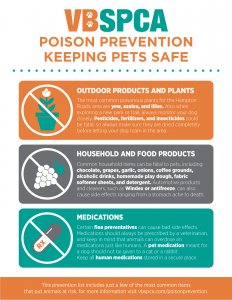An important facet of pet ownership is keeping your pet safe. While some dangers are clear and obvious, many potential threats are not… especially when it comes to what your pet ingests. Please familiarize yourself with the below list of potentially dangerous substances along with some tips on how to safely store items in your home. Being cautious and aware could potentially save your pet’s life.
Outdoor Products and Plants
When exploring a new park or trail, always monitor your dog closely. Pesticides, fertilizers, and insecticides could be fatal, so always make sure they are dried completely before letting your dog roam in the area. Additionally, remember to always store lawn products out of your pet’s reach. Plants can also be dangerous for both cats and dogs. The most common poisonous plants for the Hampton Roads area are yew, azalea, and lilies. Cat owners should be especially careful with lilies – click here to learn more.
Household and Food Products
Many common household items can be fatal to pets. These include chocolate, grapes, garlic, onions, coffee grounds, alcoholic drinks, homemade play dough, fabric softener sheets, and detergent. Cleaners and automotive products, such as Windex or antifreeze, can also cause side effects ranging from a stomach ache to death. Keep all of these products in a secure place that you know your animals cannot access.
Medications
Medications should always be prescribed by a veterinarian, and keep in mind that animals can overdose on medications just like humans. Also, certain flea preventatives can cause side effects, so make sure to always consult your veterinarian before purchasing a specific brand. Another common way to poison your pet is by accidentally using products on one animal that are meant for another. A pet medication meant for a dog should not be given to a cat or a rabbit. Keep human medications stored in a secure place. One 500mg tylenol tablet could be fatal to a cat and one 200mg ibuprofen could potentially cause stomach problems in a smaller dog.
Things to remember
- Keep all products out of your furry friend’s reach.
- When in a new outdoor place, monitor your dog closely to ensure he or she is not ingesting something dangerous.
- Medications are species specific and are only to be given after being prescribed or speaking to your pet’s veterinarian.
- If your pet has ingested something that it should not have, please see a veterinarian immediately.

Last Updated: May 27, 2022 by vbspcaadmin
Helpful Tips to Protect Your Pet Against Poison
An important facet of pet ownership is keeping your pet safe. While some dangers are clear and obvious, many potential threats are not… especially when it comes to what your pet ingests. Please familiarize yourself with the below list of potentially dangerous substances along with some tips on how to safely store items in your home. Being cautious and aware could potentially save your pet’s life.
Outdoor Products and Plants
When exploring a new park or trail, always monitor your dog closely. Pesticides, fertilizers, and insecticides could be fatal, so always make sure they are dried completely before letting your dog roam in the area. Additionally, remember to always store lawn products out of your pet’s reach. Plants can also be dangerous for both cats and dogs. The most common poisonous plants for the Hampton Roads area are yew, azalea, and lilies. Cat owners should be especially careful with lilies – click here to learn more.
Household and Food Products
Many common household items can be fatal to pets. These include chocolate, grapes, garlic, onions, coffee grounds, alcoholic drinks, homemade play dough, fabric softener sheets, and detergent. Cleaners and automotive products, such as Windex or antifreeze, can also cause side effects ranging from a stomach ache to death. Keep all of these products in a secure place that you know your animals cannot access.
Medications
Medications should always be prescribed by a veterinarian, and keep in mind that animals can overdose on medications just like humans. Also, certain flea preventatives can cause side effects, so make sure to always consult your veterinarian before purchasing a specific brand. Another common way to poison your pet is by accidentally using products on one animal that are meant for another. A pet medication meant for a dog should not be given to a cat or a rabbit. Keep human medications stored in a secure place. One 500mg tylenol tablet could be fatal to a cat and one 200mg ibuprofen could potentially cause stomach problems in a smaller dog.
Things to remember
Category: VBSPCA News
Search
Recent Posts
Topics